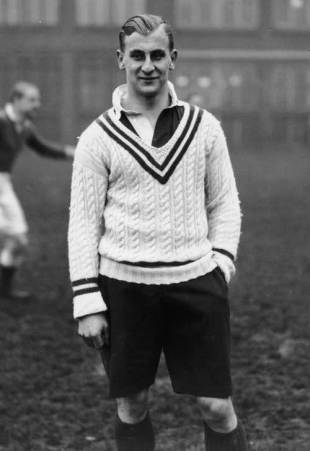|
England 13-0 New Zealand, Twickenham
The Prince leaves his mark on Twickenham
Richard Seeckts
January 4, 1936

Prince Alexander Obolensky cuts a relaxed figure before the match with the All Blacks
© Getty Images Enlarge
England's first victory over the New Zealand All Blacks was as emphatic as it was surprising. In what has passed into rugby folklore as 'Obolensky's Match', New Zealand were outplayed as well as beaten in the 28th, and last, match of their tour. In 91 matches over three tours before World War II, this was only their fourth defeat. Few observers gave England much chance of victory before the game, but England had a debutant on each wing, Hal Sever on the left and 19-year-old Prince Alexander Obolensky on the right. Sever had the more glittering career of the two, being England's premier wing in the pre-war years, and he scored the third try in this match, but he is a forgotten man in comparison to his Russian born counterpart. Obolensky's family had fled Russia after the 1917 Revolution and settled in Muswell Hill, London. 'The Prince', as he was widely known, was by now at Brasenose College, Oxford studying Politics, Philosophy and Economics, in which he eventually achieved a rare fourth class degree. His selection for England was slightly contentious and said to be dependent upon his assurance that he would become a British Citizen, a process that was completed a few weeks after the match. The Prince of Wales, soon to become King Edward VIII, greeted Obolensky before the match with, "By what right do you play for England?" Obolensky replied "I attend Oxford University....Sir", so putting the future monarch firmly in his place. England's South African fullback, Tuppy Owen-Smith, had already played Test cricket for South Africa against England, so may have encountered similar royal frostiness. The Times reported the reasons for England's victory "were crushingly simple. England had the weight, developed the teamwork and possessed, where it was most wanted, the quality of swiftness too". It is perhaps ironic that a team selected the day before the match after one "close to farcical" training session at the Honourable Artillery Company Ground in the City demonstrated greater teamwork than a touring party that had been together for 27 games. England's forwards pinned down their opponents, sapping their energies in the loose. Perhaps the most significant feature of the match, according to The Times, "was the way in which the All Blacks' forwards struggled in vain to get very far." The tackling of England centres Peter Cranmer and Ronald Gerrard snuffed out New Zealand's attacking moves, smothering their opposite numbers and preventing New Zealand fly half, Snowy Tindill, making any impact in his only international match. On such a platform England's speedy backs could flourish. Owen-Smith "dared greatly, made one or two mistakes that might have been fatal and, yet, by some magic touch peculiar to himself, came out of the match with flying colours." He provided the early thrills, twice delaying his kicks until he had dodged one or two oncoming opponents. Obolensky's first try would have been the highlight of many a match. A passing move started in England's half saw him take the ball around half way, turn inwards and then outwards at such pace that he rounded Mike Gilbert untouched near the right touchline before crossing the try line close to the posts. Dunkley's conversion bounced back off the crossbar, but England were galvanised by having scored first and able to capitalise with crushing effect.

England line up ahead of their match with New Zealand
© PA Photos
Enlarge
Minutes later came the try still talked about at Twickenham. Obolensky took a pass from Peter Candler wide on the right but his path was blocked. He veered left to avoid would-be tackler Mitchell and just kept going, leaving All Black defenders utterly bemused and wrong-footed, so far left that he might have been ushered into touch had he not turned inside, again untouched, and scored on the left, in Twickenham's north-west corner. This time Gerrard missed the conversion; half time came with England 6-0 up. Early in the second half Mike Gilbert missed a drop goal attempt for New Zealand. Cranmer put one over for England - drop goals being worth four points in those days - and England never looked likely to be beaten after this. Hal Sever's try midway through the half provided the icing on England's cake. Gilbert missed with a couple of penalty kicks, ensuring this was the only match on tour in which New Zealand failed to score a point. New Zealand were completely outclassed on the day. Obolensky's name and reputation were made; he and Wavell Wakefield of pre-World War II players have hospitality suites named in their honour at the modern Twickenham. He played the remaining three internationals in 1936 but barely received a pass and didn't score a try. He continued to play at Oxford and for Rosslyn Park when he came down, but was never picked for England again. Obolensky became a Pilot Officer with the RAF and was the first of 14 England players killed in World War II when his Hawker Hurricane crashed in training at Martlesham Heath Air Base in Suffolk on March 29 1940. He was 24. © ESPN Sports Media Ltd.
| |||||||||||||||
Live Sports
Communication error please reload the page.
-
Football
-
Cricket
-
Rugby
-
- Days
- Hrs
- Mins
- Secs
F1 - Abu Dhabi GP
Abu Dhabi Grand Prix December 11-131. Max Verstappen ()
2. Valtteri Bottas (Mercedes)
3. Lewis Hamilton (Mercedes)
4. Alexander Albon ()
5. Lando Norris ()
6. Carlos Sainz Jr ()
-
ESPNOtherLive >>
Snooker - China Open
Tennis - Miami Open

